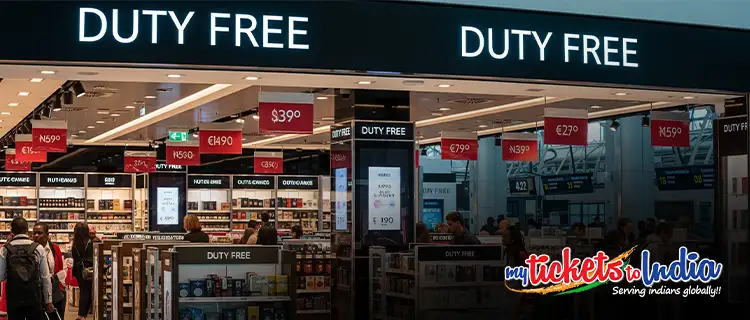Duty Free Shopping Explained – What You Can Buy on Flights from Australia to India?

Last Updated on Sep 16th, 2025 by Neha Sharma, Leave a Comment
Soon to take a flight from Australia to India? Duty-free shops at airports can be the ideal location to find discounted travel needs, luxury goods & presents. However, you must comprehend duty-free shopping its operation & the amount you are permitted to bring in order to gather the full benefits. The meaning of duty-free allowances for alcohol, tobacco, jewelry & other items as well as the regulations you must stand by upon arrival in India are all explained in this guide. With the correct information you can easily guide Indian customs without obtain additional fees & shop wisely at Australian airports.
What Is Duty-Free Shopping?
Duty-free refers to goods that are sold without the usual import taxes & levies that are applied in the nation in which the store is located. Only travelers with authentic passports & international boarding passes are permitted to shop at duty-free shops which are usually found in international airport terminals (departures and arrivals). Duty-free purchases allow travelers to access exclusive or limited-edition goods, maximize their travel budgets & avoid paying high local taxes.
What You Can Buy and What’s Offered in Duty-Free Stores?
At duty free stores (airport stores, transit zone shops), you’ll typically find:
- Alcohol & Liquor (spirits, wine)
- Tobacco products (cigarettes, cigars, loose tobacco)
- Perfumes, fragrances
- Cosmetics & beauty products
- Fashion items – bags, shoes, accessories, maybe branded clothes
- Watches, small electronics, headphones etc.
- Souvenirs, chocolates, food/confectionery
These are common product types in airport duty free stores / duty free store meaning.
Suggested – Guide to shopping at Airport
How Much You Can Shop / Allowances & Limits (India Arrival)
There are legal restrictions on the amount and value of duty-free items you can bring into India from outside of Australia or the majority of other nations without incurring additional customs fees. These are crucial so that you can benefit from duty-free shopping without being caught off guard at customs.
Here are the main allowances / limits –
| Item Type | Maximum Allowed (Duty-Free on Entry) into India for Most Travellers |
| Alcohol / Liquor / Wine | 2 litres per person |
| Tobacco / Cigarettes / Cigars | 100 cigarettes, or 25 cigars, or 125 grams of tobacco per person. |
| Total Value of All Duty-Free Purchases (other items + alcohol/tobacco etc.) | Up to Rs. 50,000 for Indian residents, foreigners residing in India, or tourists of Indian origin (arriving from any country except Nepal, Bhutan, Myanmar) without paying duty. |
| Lower Value Limit for Some Travellers / Regions | If arriving from Nepal, Bhutan or Myanmar → value limit is Rs. 15,000. Also for many foreign tourists, gifts/souvenirs etc. may be restricted to this lower Rs. 15,000 limit. |
| Jewellery / Gold (ornamental) | If Indian passenger has been living abroad for over 1 year: males can bring Rs. 50,000 worth; females Rs. 1,00,000 worth of jewellery (ornamental). |
- Infants (very young children) have special rules – only used personal effects are allowed duty-free for them.
- Some items (very large electronics like flat-panel TVs, etc.) are excluded from being counted under the duty-free allowance. If you bring those, they may incur duty even if the total value seems under limit.
Suggested – Can you bring a car seat on a plane?
How Duty Free Shopping Works in Practice (From Australia to India)?
This is the entire procedure, including picking what to buy, carrying it & going through customs.
At the Australian Airport (Departure / Transit)
- Visit the airport duty free shop. You must present your boarding pass or airline ticket as proof that you are departing the nation.
- Purchase goods like cosmetics, perfumes, alcohol etc. These stores function as “duty free stores,” which means that since the goods are intended for export or travel you are exempt from some taxes that are applied to domestic sales.
- For each purchase you will receive a receipt. Keep them secure.
Packing & Carrying Your Duty-Free Purchases
- Liquids – The store typically seals liquids (like alcohol & perfume) in a clear bag after you pass security. Verify if the seal must stay in place or if you need to rescreen if you have a transit connection.
- Carry-on vs Checked Baggage – Smaller, more delicate items or items you wish to bring with you such as gifts or perfume are usually placed in carry-on luggage. Heavy or bulky items may be found in checked baggage. Be mindful of the airline baggage weight & size restrictions.
Suggested – Can you bring Alcohol on a Plane?
In Flight / Arrival
- You enter customs when you arrive in India. If you have nothing over duty-free limits, you will be prompted to select the Green Channel if you must declare anything over the limit you will be asked to select the Red Channel.
- If asked show your receipts. Your belongings or baggage may be inspected by customs officials.
If You Exceed the Allowance
- Duties & taxes will be due on the excess if your purchase exceeds any of the limits (alcohol, tobacco, value, etc.).
- Inaccurate declarations could result in the confiscation or punishment of certain items. On the customs declaration form always be truthful.
Suggested – Qantas Dangerous goods
Jewellery / Gold Rules
- You are not required to pay for ornamental jewelry up to a certain amount if you are an Indian national or resident who has been overseas for more than a year.
- If you go over that amount you might have to declare & pay duty. Gold & silver that are not ornaments might be prohibited or subject to high taxes.
Suggested – How much gold can i carry to India?
Tips & Things to Watch Out For!
- Keep your duty-free store receipts at all times, they serve as your documentation.
- If you have stopovers, check the transit airport’s regulations, duty-free goods may need to be repackaged or adhere to extra security requirements.
- Be mindful of baggage weight restrictions and additional costs, as these can occasionally negate or eliminate any savings from duty-free shopping.
- Just because something is “duty-free” doesn’t mean it’s cheaper. When you arrive, some products may be more affordable locally or through online sales. Make a rough comparison.
- Don’t buy so much that you go over value limits (usually Rs. 50,000) because even a tiny excess could result in a high customs tax.
- To avoid problems find out what is prohibited or restricted (eg certain electronics, rare items, certain plants).
Real Numbers & Example!
To make things clear, here’s a hypothetical scenario –
- Suppose you are flying from Sydney to Delhi.
- You purchase a designer watch worth Rs. 20,000, 100 cigarettes, 1.8 litres (just under 2 litres) of whisky, a perfume worth Rs. 15,000, some cosmetics, snacks & souvenirs worth Rs. 5,000 at the duty-free store.
- Verify the guidelines. Limits of two liters of alcohol & one hundred cigarettes of tobacco are acceptable. The sum of the non-alcoholic & tobacco products is Rs. 15,000 + 20,000 + 5,000 = Rs. 40,000. You consider the total value which includes the cost of alcohol & tobacco. Assume that the total cost of alcohol, tobacco & other items is Rs. 48,000 which is less than the Rs. 50,000 limit.
- In India, you can pass through the Green Channel at customs without earn additional fees.
- However, you would have to declare the extra Rs. 10,000 & probably pay customs duty & taxes on that excess amount if you purchased a watch, perfume & souvenirs totaling Rs. 60,000.
Top Routes From Australia To India If your are Planing to Fly?
- Melbourne to Mumbai Flights
- Sydney to Ahmedabad Flights
- Perth to Amritsar Flights
- Brisbane to Delhi Flights
- Adelaide to Kolkata Flights
Conclusion!
- Duty-free (define duty free) means reduced or zero taxes on some goods when purchased for international travellers.
- You can buy many things: liquor, tobacco, cosmetics, perfumes, electronics, fashion items.
- On arrival in India, you can bring: up to 2 litres alcohol, up to 100 cigarettes (or equivalent tobacco), total value up to Rs. 50,000 in most cases; lower value if you’re coming from certain countries or are certain categories of travellers.
- You must carry receipts, use the correct customs channel (Green if under limits, Red if over), declare if needed.
Frequently Asked Questions
Q: What if I buy something duty-free in Australia then give it as a gift in India, does its value still need declaring?
A: The value of the gift & even if you exceed the duty-free limit are undoubtedly what matter in terms of customs.
Q: Can I buy duty free items at the arrival hall in India?
A: Yes, duty-free shops can be found in both the arrival & departure areas of many Indian airports, including Delhi, Mumbai, Bengaluru & others. The same allowances (e.g., 100 cigarettes, 2 liters of liquor, etc.) apply when you shop there.
Q: Are duty free prices always cheaper than local store prices?
A: Not all the time, Certain products such as luxury brands, liquor, tobacco & perfumes are typically less expensive duty-free. However, commonplace items & electronics can occasionally be just as expensive as or more expensive than city prices.
Q: Can I combine my duty free allowance with a family member’s allowance?
A: No, The allowance is different for each passenger. Every traveler is treated differently by customs. You cannot bring more alcohol or tobacco under one name by combining allowances.
Q: How are liquids handled if I have a transit stop before reaching India?
A: Make sure that liquids (more than 100 ml) are sealed in a clear bag by the duty-free store if you are transiting. If not, they might be seized by airport security at the transit stop.
Q: Are electronics and gadgets included in the Rs. 50,000 duty-free limit?
A: Yes for the purposes of the Rs. 50,000 allowance, electronics & gadgets are regarded as ‘general goods.’ Large televisions & some pricey electronics may not qualify and may be subject to additional taxes.
Q: What happens if my duty free items exceed the allowance in India?
A: At customs you have to go through the Red Channel, declare the excess & pay duty or tax on the excess amount or value. Customs may seize goods or impose fines if you fail to declare and are apprehended.
Q: Is there a separate allowance for perfumes and cosmetics?
A: Not a separate allowance. Cosmetics & perfumes fall under the general goods limit, which is Rs. 50,000 for adults in the majority of countries.
About Neha | View Posts
Neha Sharma, a passionate travel blogger, captures the beauty of the world through her words. With her adventurous spirit and a keen eye for detail, Neha takes her readers on mesmerizing journeys to exotic destinations. Her vivid descriptions and insightful tips make her the go-to guide for wanderlust seekers. Join Neha as she explores the globe, sharing her love for travel and inspiring others to go on their unforgettable adventures.
Latest Blog
-
Sleepless on a Plane? Not Anymore - Here’s How to Catch Real Zzz’s!!
Updated on 16 Sep 2025 -
Is It Safe to Fly with Air India From Australia To India?
Updated on 27 Aug 2025 -
Guide to Booking Multi-City Flights in Advance – Tips, Process & Group Travel Information!
Updated on 20 Aug 2025 -
Qantas Direct Flights Routes from Australia to India
Updated on 28 Apr 2025 -
Air India Direct Flights Routes from Australia to India
Updated on 28 Apr 2025

Discuss this post ?